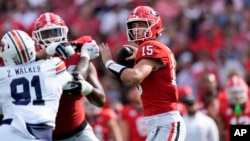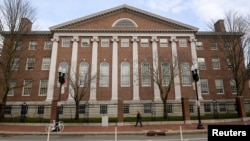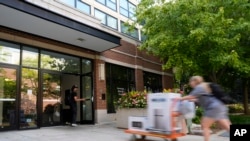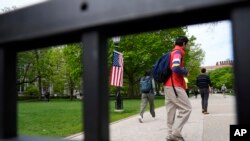Student Union
NCAA's $2.78 billion settlement with colleges to allow athlete payments gets preliminary approval

A judge granted preliminary approval Monday to the $2.78 billion legal settlement that would transform college sports by allowing schools to pay players.
U.S. District Judge Claudia Wilken released an order setting a timeline for a deal that would put millions of dollars into the pockets of college athletes, who can begin applying for payment on October 18.
A final hearing is set for April 7, 2025, the day of college basketball's national title game. If finalized, the deal would allow the biggest schools to establish a pool of about $21.5 million in the first year to distribute to athletes via a revenue-sharing plan. Athletes would still be able to cut name, image and likeness deals with outside groups.
"We are pleased that we are one step closer to a revolutionary change in college athletics that will allow billions in revenue sharing," said plaintiff attorney Steve Berman.
The judge's approval comes 11 days after attorneys tweaked wording in the original settlement agreement to address Wilken's concerns. The main change involved getting rid of the word "boosters" and replacing it with a better-defined description of whose potential NIL deals would be subject to oversight by a neutral arbitrator once the deal goes through.
That did not, however, strike to the heart of the settlement, which sets up a revenue-sharing arrangement between schools and the athletes. The $21.5 million figure comes from the 22% of average revenue that power conference schools generate through media rights, tickets and other sources. It will be recalculated periodically through the 10-year window that the agreement covers.
"We are thrilled by Judge Wilken's decision to give preliminary approval to the landmark settlement that will help bring stability and sustainability to college athletics while delivering increased benefits to student-athletes for years to come," NCAA President Charlie Baker said. "Today's progress is a significant step in writing the next chapter for the future of college sports."
This settlement also allows former players to apply for payments to make up for lost revenue they would have received through NIL deals that weren't allowed in college sports before 2021. It sets up a framework to regulate future NIL deals and replaces scholarship caps with "roster limits," which will grow to 105 for football, the biggest sport at most major universities.
This settlement resolves three major antitrust lawsuits filed against the NCAA, including one spearheaded by Grant House, a former swimmer at Arizona State University. Berman's law firm says the value of new payments and benefits to college athletes is expected to exceed $20 billion over 10 years.
Still unknown, however, is how long the terms of this deal will last. Litigation regarding the rights of players to unionize and potentially be considered employees remains unsettled. Meanwhile, the NCAA is pushing for federal legislation to knit together a streamlined policy for NIL, which is currently regulated by a patchwork of state laws, legal settlements and NCAA rules.
See all News Updates of the Day
Fewer students disclose race in applications to top colleges

FAfter the Supreme Court’s decision to end affirmative action in college admissions last year, fewer students are disclosing their race or ethnicity in applications to top colleges.
Writing in USA Today, Zachary Schermele notes that the data is preliminary, but it could signal a change in the way students are approaching college applications. (October 2024)
Overall college enrollment is up, first-year enrollment down

For the second year since the beginning of the COVID-19 pandemic, college enrollment has climbed in the United States.
But the National Student Clearinghouse Research Center noticed a substantial drop in the number of freshmen, which could be troubling for future enrollment, according to a report in Forbes. (October 2024)
South African universities embrace AI, seeing it as equalizing tool
The rise of AI tools like ChatGPT has sparked debate in higher education, raising questions about ethics and integrity in teaching, learning and knowledge creation. In South Africa, some academic institutions are taking a proactive approach, integrating AI into their curricula. Experts say this step is not only innovative but also helps level the playing field among students. Zaheer Cassim reports from Johannesburg.
International students may be able to get jobs at school

International students studying in the United States may be able to work on campus.
Jobs can include working in libraries, labs, food service and dormitories – but students will have to research the rules before applying for jobs, according to U.S. News & World Report. (September 2024)
Report says college rankings have the potential to mislead

Each year, prominent lists of college and university rankings are compiled and released to the public, but a report conducted by NORC at the University of Chicago says those rankings have the potential to mislead.
Writing in Forbes, Vanderbilt University Chancellor Daniel Diermeier says changing methodologies can distort results, and profit motives can create doubt. He argues that rankings should be replaced by an objective rating system. (September 2024)








